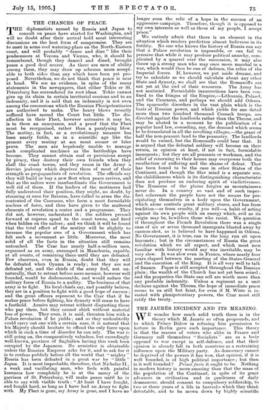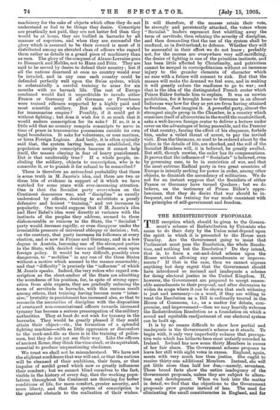machinery for the sake of objects which often they do
not understand or feel to be things they desire. Conscripts are practically not paid, they are not better fed than they would be at home, they are bullied in barracks by all manner of superiors, and when they are successful the glory which is assumed to be their reward is most of it distributed among an elevated class of officers who regard them rather as details in a grand piece of machinery than as men. The glory of the conquest of Alsace-Lorraine goes to Bismarck and Moltke, not to Hans and Fritz. They are said to be moved by desire to defend their country ; but if all the nations disarmed at once no country would ever be invaded, and in any case each country could be defended perfectly well upon the Swiss system, which is substantially a careful training to arms for six months with no barrack life. The rest of Europe combined would find it unprofitable to invade either France or Germany if all Germans or. Frenchmen were trained riflemen supported by a highly paid and most scientific artillery. But each country wishes for transmarine empire ? Possibly, if it could get it without fighting ; but does it wish for it so much that it would endure conscription for its sake ? If so, it is a little odd that no country compels conscripts to serve in time of peace in transmarine possessions outside its own legal boundaries. It asks for volunteers, or uses marines, or hires Foreign Legions. And lastly, it is often cynically said that, the system having been once established, the population accepts conscription because it cannot help itself, the masses obeying in fear of heavy punishment. But is that unalterably true ? If a whole people, in- cluding the soldiery, objects to conscription, who is to conscribe it, or to punish it for refusal to be conscribed ?
There is therefore an antecedent probability that there is some truth in M. Jaures's idea, and there are two or three bits of evidence in support of it which we have watched for some years with ever-increasing attention. One is that the Socialist party everywhere on the Continent denounces war, and " discipline " as usually understood by officers, desiring to substitute a purely defensive and lenient "training," and yet increases in popularity. One would suppose that if M. Jaures's idea and Herr Bebel's idea were directly at variance with the instincts of the peoples they address, seemed to them dishonourable or ruinous to the State, the " Socialist " party would decrease rapidly, or even disappear under the irresistible pressure of universal obloquy or derision ; but, on the contrary, that party increases its followers at every election, and is now in France and Germany, and in a less degree in Austria, becoming one of the strongest parties in the State, with decided views and influence, even upon foreign policy. It would be very difficult, possibly even dangerous, to " mobilise " in any one of the three States without a motive which seemed to the masses reasonable ; and that "difficulty" is precisely the "influence" of which M. Jetties speaks. Indeed, the very rulers who regard con- scription as the sheet-anchor of the State are admitting the soundness of his position, for, in spite of strong oppo- sition from able experts, they are gradually reducing the term of servitude in barracks, with this curious result among others, that training having become more "inten- sive," brutality in punishment has increased also, so that to reconcile the necessities of discipline with the disposition of overtaxed non-commissioned officers towards increased tyranny has become a serious preoccupation of the military authorities. They at least do not wish for tyranny in the barracks. They would be greatly pleased if they could attain their object—viz., the formation of a splendid fighting machine—with as little oppression or discomfort to the rank-and-file as there is in the training of police- men, but they do not yet see their way. Like the officers of ancient Rome, they think the vine-stock, or its equivalent, essential to produce unquestioning obedience.
We trust we shall not be misunderstood. We have not the slightest confidence that war will end, or that the nations will be cleansed of their ambitions, their fears, or that impulse of sordid greed which now so greatly influences their conduct; but we cannot blind ourselves to the fact, visible in the history of every day, that the working popu- lations throughout the Continent are thirsting for better conditions of life, for more comfort, greater security, and more liberty, and that the system of conscription IS the greatest obstacle to the realisation of their wishes. It will therefore, if the masses retain their vote, be strongly and persistently attacked, the voters whom " Socialist " leaders represent first whittling away the term of servitude, then relaxing the severity of discipline, and then demanding that the use of the system shall be confined, as in Switzerland, to defence. Whether they will be successful in their effort we do not know ; probably not, for the masses are everywhere very self-sacrificing, the desire of fighting is one of the primitive instincts, and has been little affected by Christianity, and patriotism cannot be merged in cosmopolitanism without an immense injury to the grander elements of character which no race with a future will consent to risk. But that the masses will make the demand we feel sure, and in making it will greatly reduce the readiness to go to war ; and that is the idea of the distinguished French orator which Prince Billow forbade him to explain. It was an unwise prohibition, for it brought home to Germans in an almost ludicrous way how far they as yet are from having attained to freedom. Just imagine it. A powerful party, almost the strongest single group in the Chamber, in a country which considers itself of all countries in the world the mostcivilised, asks a well-known foreign orator to deliver a lecture under cover on the advantages of being peaceable, and the Premier of that country, fearing the effect of his eloquence, forbids him, under a veiled threat of arrest, to pay the invited visit. Even the Germans, so used to be ordered about by the police in the details of life, are shocked, and the roll of the Socialist Members will, it is believed, be greatly swelled. But still, though unwise, the order has its compensations. It proves that the influence of "Socialists" is believed, even by governing men, to be in restriction of war, and that the most extreme Radical party in two great countries of Europe is intently seeking for power in order, among other objects, to diminish the ascendency of militarism. We do not for an instant suppose that the Socialists of either France or Germany have turned Quakers ; but we do believe, on the testimony of Prince Billow's appre- hensions, that they do desire that war should be in- frequent, and the training for war made consistent with the principles of self-government and freedom.







































 Previous page
Previous page